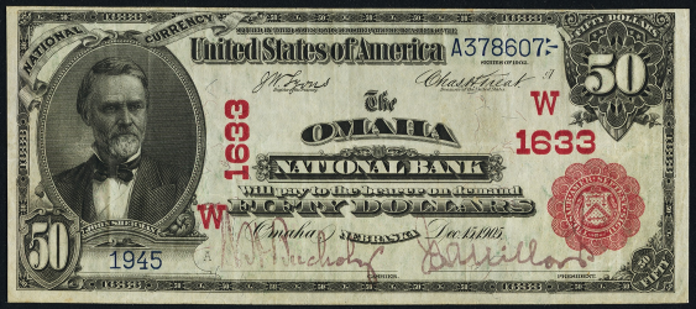Fifty Dollar Notes › Nationals › 1902 Fifty Dollar National Bank Notes › Pennsylvania Charters › 1902 $50 Plymouth Pennsylvania First National Bank
Get Value Now
| Item | Info |
|---|---|
| Series | 1902 |
| Charter | #707 First National Bank of Plymouth, Pennsylvania |
| Year Chartered | 1865, 944 Banks Chartered |
| City Info | Plymouth is an incorporated borough in Luzerne County, Pennsylvania, United States, 4 miles west of Wilkes Barre, on the Susquehanna River. Prior to its incorporation in 1866, it was part of Plymouth Township, established in 1769 by the Susquehanna Company and claimed by Connecticut based on the charter of that colony. The Pennamite-Yankee War was fought in the environs. Source: Wikipedia |
| Similar Cities | If your note doesn't match try: 1. Plymouth, Massachusetts - Plymouth National Bank 2. Plymouth, Massachusetts - Old Colony National Bank 3. Plymouth, Ohio - First National Bank 4. Plymouth, Michigan - First National Bank 5. Plymouth, Indiana - First National Bank of Marsh County 6. Plymouth, New Hampshire - Pemigewasset National Bank 7. Plymouth, Michigan - Plymouth National Bank 8. Plymouth, Michigan - First National Exchange Bank 9. Plymouth, Pennsylvania - Plymouth National Bank 10. Plymouth, Ohio - People's National Bank 11. Plymouth, Illinois - First National Bank 12. Plymouth, Michigan - First National Bank |
| Seal Varieties | Red, Blue |
| Other Info | 1. Value depends on notes known for charter, condition and market demand. |
| Neat Fact | Notes from common charters are less valuable compared to rarer charters. Value also depends on type, denomination and total notes known for city, state and region. Ultimate determination of value is collector demand. |
No Obligations Offers and Appraisals
Please submit a good photo or scan. It will be identified and evaluated. Understand there may be subtle differences between the image you see above and your note. Signatures, design, markings and note condition will determine the offer price. Notes in Uncirculated or better condition receive the best offers.
Appraisals can be estimated for wholesale and retail prices. Wholesale is what dealers typically pay. Retail is what a collector might pay. Retail is slightly higher in most cases.
Please visit this page for USA Paper Money Reference. Do not treat this page as a reference guide, it is for appraisal and acquisition purposes only.
